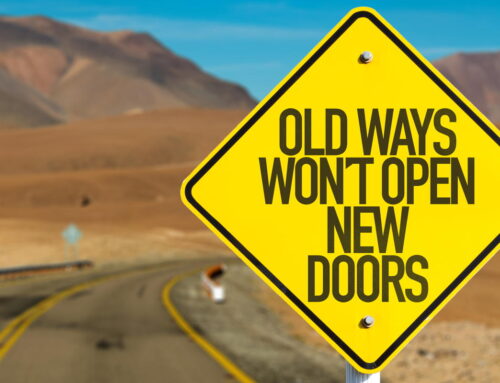Let’s face it, you should never generalize about a cohort of 76.4 million individuals. Especially the generation that made ‘do your own thing’ a badge of honor. Attaching labels or assumptions to the entire generation of Baby Boomers is dangerous at best and downright silly at worst. But fools rush in and Boomer myths are born. A recent The Economist article led with a clickbait title labeling Baby Boomers as stingy and loaded. Poppycock! But they aren’t alone. Axios recently insisted that a “gray trap” is about to overtake the US economy and healthcare system. And senior living has been eagerly anticipating the silver tsunami about to beat down their doors for years. It’s time to bust these Baby Boomer myths with actual facts.
Boomers Are/Not Loaded
The author of The Economist makes a point that Boomers, who make up 20% of the country’s population, own 51.8% of its net wealth. BUT this data from the Visual Capitalist offers more context:
- 27.4% of Boomers are billionaires. Their average net worth is $4.6 billion. (Spoiler alert: they have most of the money!)
- 38% of the Silent Generation are billionaires. Their average net worth is $5.5 billion.
- 30.2% of Millennials are billionaires. Their average net worth is $5.12 billion.
But percentages don’t tell the full story. There are 806 billionaires in the US. Their combined wealth is more than 65 million US households combined. When we look specifically at Boomers:
- Over half of Boomers have less than $250,000 saved for retirement.
- 14.6% have about $500,000 in the bank for their retirement.
- 40% of Boomers rely solely on Social Security for their income.
- The average monthly Social Security check in April 2024 was $1,915, or $22,980 annually.
- 7% of retirees have a pension, significant savings and Social Security to fund their lifestyle.
The reality is that almost half of Boomers must rely on Social Security to cover some or all of their retirement. The Federal Poverty Level is $20,440 in 2024. Billionaires are loaded. The vast majority of Baby Boomers are not.
Boomers Will/Not Share the Wealth
The underlying premise of the Great Wealth Transfer is that when Boomers die, their wealth will be redistributed. The reality is very different for those who are not part of generational wealth. Three-fourths of the cohort will have little to leave to loved ones. One reason is longevity and the rising cost of healthcare.
Half of all Americans want to live to be a centenarian.  But studies show that while we may be living longer, we’re not living healthier lives. In fact, the last 15% of our life is likely to be in poor health. Coincidentally, Fidelity Investments estimates the average retired couple should be prepared for healthcare costs to account for 15% of their budget or approximately $300,000 over the course of their retirement. Should you require long-term care, those costs will soar even higher. And then there’s the fact that up to 65% of Boomer parents provide some measure of support for their adult children on an ongoing basis.
But studies show that while we may be living longer, we’re not living healthier lives. In fact, the last 15% of our life is likely to be in poor health. Coincidentally, Fidelity Investments estimates the average retired couple should be prepared for healthcare costs to account for 15% of their budget or approximately $300,000 over the course of their retirement. Should you require long-term care, those costs will soar even higher. And then there’s the fact that up to 65% of Boomer parents provide some measure of support for their adult children on an ongoing basis.
Boomers Have/Not the Best Houses
When we look at the housing market, two things immediately stand out. According to a Redfin survey, empty nest boomers own a significant percentage of larger homes. In my local market, they own 26.5% of homes with 3+ bedrooms. Millennials with children, on the other hand, own 13.5% of the larger homes in Charlotte, NC. The unspoken assumption is Boomers are being selfish by continuing to stay in their family homes when younger families need them. Nonsense.
While some Boomers might consider downsizing,  there are excellent reasons to stay. First, most Americans want to age in place. Second, the current interest rate for mortgages is high compared to rates most Boomers enjoy if they haven’t already paid it off. Third, downsizing can be traumatic (see my first point) even if you can find a home that fits your needs as you age. Let’s face it, fewer than 4% of available homes offer no step entries, wider doorways & hallways and single floor living, which are essential as we age. And fourth, like Gen X and Millennials, Boomers also have Boomerang children who have moved back home because of joblessness, divorce, health and a host of other reasons.
there are excellent reasons to stay. First, most Americans want to age in place. Second, the current interest rate for mortgages is high compared to rates most Boomers enjoy if they haven’t already paid it off. Third, downsizing can be traumatic (see my first point) even if you can find a home that fits your needs as you age. Let’s face it, fewer than 4% of available homes offer no step entries, wider doorways & hallways and single floor living, which are essential as we age. And fourth, like Gen X and Millennials, Boomers also have Boomerang children who have moved back home because of joblessness, divorce, health and a host of other reasons.
Boomers Are/Not the Most Fortunate
In their list of reasons why this generation is so fortunate, The Economist noted most did not fight a war and a lucky bunch got to see the Beatles live. What odd benchmarks to evaluate their lives. And as with so much, they’re perpetuating more Baby Boomer myths.
American Boomers did have to fight a war. The first Boomers turned 18 in 1964, midway through the Vietnam Conflict. From 1964 to 1973, more than 1.9 million people were drafted. While many Boomers were against the war, more than 40% of this generation served in the military. And of the 58,148 who were killed in Vietnam, 61% were younger than 21 years old, in other words, they were Baby Boomers.
While the Beatles were influential, they weren’t the only significant musical artists of the decade. Elvis, Dylan, The Who, The Rolling Stones, Simon & Garfunkel, The Doors, Aretha Franklin and The Supremes helped define the transformative music of the 60s.
Individuals Not Masses
Baby Boomers simply cannot be generalized; they are as different as Cher and Katie Couric. For senior living marketers, that means you need to focus on the individual and avoid lumping together the masses. You need to get your message in front of the right Boomers. But knowing who they are takes more than a ZIP code list. Sabal and Maribeth are ready to help you identify your audience as you bust your own Baby Boomer myths. Give us a call today!






